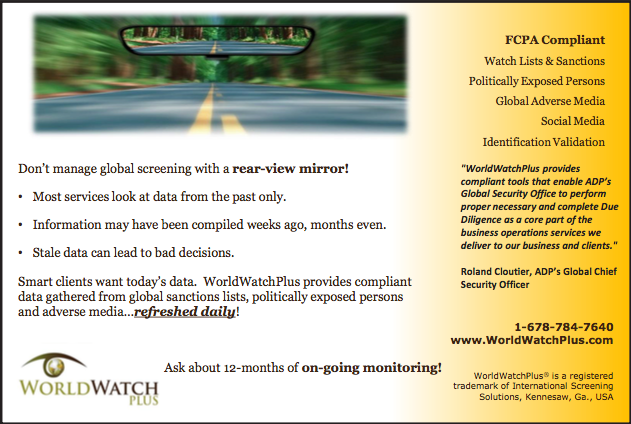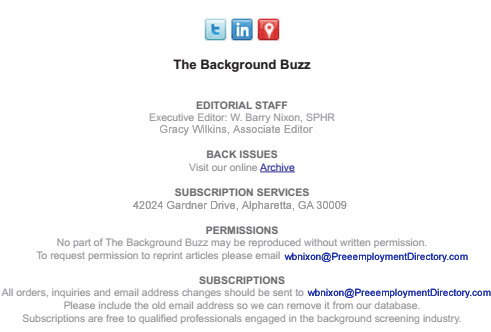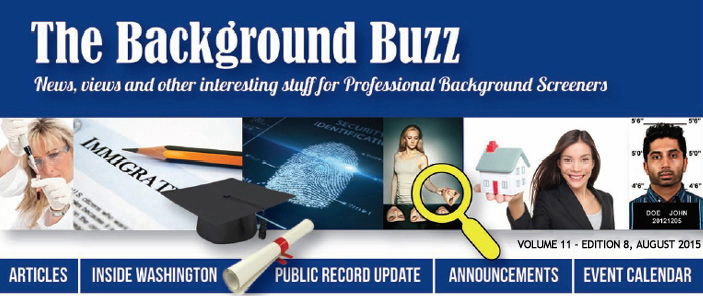 |
Oté(greeting in French Creole on Reunion Island) There is a lot going on in Washington that has the potential to impact the background screening industry. Be sure to read the Washington Report to stay on top of emerging issues. Also don’t miss this month interview in The Background Bistro with Sherri Ervin, Owner, The Public Record Source. It is one of the most insightful, informative and provocative interviews we have ever experienced. Can you believe we are already starting to be contacted by clients who are starting their budget planning for 2016. Well I guess time marches on. We are working on our 2016 Marketing Portfolios and will have them available in September. In the interim, as you focus on continuing to drive for business this year and plan for next year think about our HR eDirect Mail Service which can provide you contact information on over 100,000 HR Managers. We are selling our HR email list on a state by state basis. Click here to read about the service. Email me at wbnixon@Preemploymentdirectory.com to get your sample of up to 100 HR email contacts. We will also start our marketing outreach for thepremier publication in the industry,the 2016-17 Annual Background Screening Industry Resource Guide, in the fall.The next Resource Guide will once again be launched at the SHRM Annual Conference and distributed to 30,000 HR Managers. Keep an eye out for the announcement on this great way to reach out to your target market. If you are going to be at the NAPBS Annual Conference in Austin be surevisit our booth to find out about a new service we will be launching. Thanks for joining us this month and may God’s blessings be with you. Réunion Creole or Reunionese Creole (réunion creole: kréolréyoné, French: créole réunionnais) is a creole language spoken by 90% of the population although French is the official language. |
US ARTICLES:
INTERNATIONAL ARTICLES:
|
![]() IN THIS EDITION
IN THIS EDITION ![]()

![]()
What Do Consumers Really Think About Background Checks? The consumer point of view is a unique perspective often overlooked in the background screening and human capital management industries. We wondered what do consumers, individual applicants or candidates feel about having to go through background checks when applying for a new job, a housing lease or volunteer work? Therefore, to measure consumer sentiments around background screening, we worked with third party research firms to conduct online surveys in the U.S., the U.K. and Asia Pacific (APAC). The consumer survey actually revealed widespread support for background screening, with 82% of consumers saying that organizations should run background checks. In addition, they feel 55% of job applicants embellish on their resumes. However, only 23% of those surveyed actually admitted that they themselves have embellished on their own resumes or in job interviews. Did you know that the EEOC requires employers to keep all personnel and employment records for at least one year? Just as importantly, to the extent the employer uses a screening technique, like a pre-employment test, information on its impact on candidates by sex, race and ethnicity must be kept. These requirements are set forth in the EEOC's Uniform Guidelines on Employee Selection Procedures. In a recent case, the EEOC sued a Pennsylvania janitorial and facilities management company for failure to maintain disparate impact information relative to its use of criminal background checks. The take away is to DOCUMENT, DOCUMENT, and DOCUMENT some more why you are using criminal background information as part of your job screening process.
Myths and Facts about Criminal Records While criminal records may seem pretty straightforward, there are a lot of common myths. From questions about “how far back can I check?”, “does this cover every jurisdiction?” to “should I automatically deny someone with a felony?” test your knowledge. Here are some common myths about criminal records. MYTH: My screening company has every crime in the country Fact: There is no all-inclusive criminal repository covering every city, county, state and federal agency in the U.S. MYTH: All criminal reports are the same. Fact: Not all criminal checks are created equal. MYTH: All felonies are serious crimes, and should heavily affect your decision. FACT: What constitutes a felony versus a misdemeanor or infraction will vary heavily by state, and has many levels of severity depending on the type of crime.
Security Check Firm USIS Accepts $30 Million Fraud Settlement United States Investigations Services, the security firm which vetted Edward Snowden, has agreed to a fine of about $30 million to settle U.S. charges related to the way it conducted background checks on applicants for sensitive government jobs. The Justice Department said USIS engaged in practice internally called “dumping” or “flushing,” in which the company released the background checks of individuals to the U.S. Office of Personnel Management (OPM) and presented these cases as having been completed when, in fact, they were not. USIS had been the U.S. government’s largest private provider of security checks. “Shortcuts taken by any company that we have entrusted to conduct background investigations of future and current federal employees are unacceptable,” said Benjamin Mizer, head of the Justice Department’s civil division. Using Criminal Convictions in the Hire Process: A Hobson's Choice for Employers? Is the government really telling employers that they are not allowed to disqualify an applicant because of past criminal activity? In a word, yes. That is increasingly becoming the case on the state level and has been the focus of federal enforcement efforts over the past several years, ever since the EEOC updated its guidance on this topic in 2012. This flurry of activity has made what was historically a simple hiring practice into a legal minefield. In short, restrictions on the use of criminal convictions are here to stay and likely will become even more restrictive over time. There is no sure-fire way to avoid a claim of discrimination. By putting the practices outlined in this article into place, however, companies will stand a far better chance in defending the practice when such a claim does arise.
|
|||||||||||||||||||||||||||||||||||||||||||||||
Beware of the One-Two Punch Expected in the Fair Housing Law Arena The combination of a recent unfavorable Supreme Court decision along with dramatically increased federal funding for fair housing enforcement could spell bad news. Businesses that operate in the housing industry and those businesses that provide financing and insurance coverage for the industry should be prepared for a new wave of legal challenges on the horizon. For the foreseeable future, real estate owners, brokers, developers, property managers and lenders should expect to be targeted by fair housing organizations. In response to this expected one-two punch, businesses in the industry should implement policies and practices ensuring that all housing applicants, tenants, prospective purchasers, and mortgage applicants are treated consistently, fairly, and without regard to any protected class. Insurer Required to Defend and Indemnify FCRA Action Despite Penalty Exclusions The New York Supreme Court has issued an opinion finding that an insurer has a duty to defend and indemnify a national background screening company in two FCRA actions despite the policy’s exclusions of fines and penalties. The plaintiffs sought statutory damages and alleged that a national background screening company willfully violated the FCRA. The central issue was whether the background screening company’s errors and omissions insurance policy required its insurer to defend and indemnify it. In its cross motion for summary judgment, the background screening company argued that under the policy, the insurer was required to defend and indemnify because the underlying claims constituted compensatory damages covered by the policy. This decision provides guidance on the interplay of insurance policies and claims under the FCRA.
On July 7, the United States District Court for the Southern District of California preliminarily approved a $1.75 million class action settlement under the FCRA involving Chuck E. Cheese’s background check practices. This settlement serves as another reminder of the risks that employers face in conducting background checks on prospective employees. The plaintiffs alleged Chuck E. Cheese violated the FCRA by informing applicants that a background check would be obtained through a disclosure form that contained extraneous, impermissible information. This settlement is part of a growing list of multi-million dollar settlements pertaining to employers’ background check practices and their disclosure forms.
A recent decision by the Ninth Circuit Court of Appeals affirms our faith in the federal courts on issues of workplace violence. In the case of Mayo v. PCC Structurals, Inc., the plaintiff/employee argued that he was a victim of disability discrimination under Oregon law after he was fired for threatening his co-workers. (The court notes Oregon’s disability law is similar to and similarly analyzed as the Americans with Disabilities Act.) The Ninth Circuit rejected the employee’s appeal and emphasized that its decision is limited to the “extreme facts” in this case; that is, an employee who makes serious and credible threats of violence,” and noted generally that employees who suffer from mental disabilities are protected under different circumstances.
On August 7, Delaware Governor Jack Markell signed a law to prohibit employers from interfering with the personal social media accounts of their prospective and current employees. The new law defines “personal social media” to encompass any account on a social networking site created and operated by a prospective or current employee exclusively for his or her personal use. The term does not include accounts created or operated by an employer and that are operated by an employee as part of his or her employment. The new law also forbids an employer from taking adverse action against a prospective or current employee for failing to comply with any of these requests or demands. The new Delaware law continues a growing trend across the country.
Maine Enacts Social Media Protections for Applicants and Employees Effective as of October 15, 2015, employers in Maine will be restricted in their ability to access the personal social media accounts of applicants and employees. Employers may not terminate, discipline or otherwise take adverse action against an employee, or reject an applicant, due to the employee’s or applicant’s refusal to cooperate with any prohibited request or demand. An employer who violates these prohibitions can be fined by Maine’s Department of Labor. The law provides that such fines will be not less than $100 for the first violation, not less than $250 for the second violation and not less than $500 for each subsequent violation. Maine is the twenty-third state to place restrictions on employers’ access to applicants’ and employees’ personal social media accounts.
Spokeo, Inc. v. Robins: Petitioner Argues if There is No Actual Injury-in-Fact, Plaintiff Lacks Standing to Sue Following the U.S. Supreme Court’s grant of certiorari on April 27, 2015 in Spokeo, Inc. v. Robins, No. 13-1339, the Petitioner has weighed in with their brief. As you may recall, the question before the Court has the potential to determine the future scope of congressional power, as well as consumer and workplace-related class actions: Does a plaintiff who suffers no concrete harm, but who instead alleges only a statutory violation, have standing to bring a claim on behalf of himself or a class of individuals? The Supreme Court’s decision in Spokeo is likely to dramatically affect employers, consumer reporting agencies, and other corporate defendants as well as class actions brought under various federal statutes. As Spokeo unfolds, employers should continue to closely monitor the developments in the case in light of the potential impact on prospective and current workplace and consumer litigation across a variety of federal statutes.
N.J.S.A 2C: 52-2(a) permits the Superior Court to expunge convictions of certain classes of offenses under certain enumerated circumstances. As one example, the applicant seeking the remedy must have been “convicted of a crime,” but “...not convicted of any prior or subsequent crime.” The statute also bars from eligibility those who plead guilty in one proceeding to multiple offenses committed within a short period of time. But what does this last limitation mean in practice? The Supreme Court of New Jersey addressed and answered this question In the Matter of the Expungement Petition of J.S. (A-84-13) and In the Matter of the Expungement of the Criminal Records of G.P.B, (A-2-14). So now while a quantum of doubt has been eliminated (and that is always a good thing), the statute is now more restrictive (and, for defense practitioners, this is decidedly not a good thing).
Employee’s Positive Return-to-Duty Drug Test Result Warranted Termination Despite Employer’s Use of Low Cutoff Concentrations
Large Employers Planning to Tightly Manage Employee Use of Expensive Drugs
Minnesota Court of Appeals Provides Helpful Roadmap for Employers Who Conduct Drug Testing
New Hawaii Medical Marijuana Law Bars Use in Workplace; Zero Tolerance Policies Still Enforceable
Public
Record Update
View the new system at http://icourt.idaho.gov View the existing system at https://www.idcourts.us/repository/start.do
Public Record
Retriever Network - www.PRRN.us
Start with Security: A Guide for Business, 10 Practical Lessons Businesses Can Learn from the FTC's 50+ Data Security Settlements Effectively managing security is no accident. Smart companies consider security upfront, assess their options and make good business choices based on the nature of their business and the sensitivity of the information involved. It is essential to focus on the fundamentals of sound security as the FTC outlined in Protecting Personal Information: A Guide for Business. It is important to know the personal information you have in your files and on your computers, and you only store what you need for your business. You should have a plan for how you will protect your information stored, how to properly dispose of information and have a incident response plan in the event of a breach. The FTC has resources including an online tutorial to help you think through how those principles apply to your business.
Innovative Enterprises, Inc., a strategic partner to the background screening industry and expert provider of court research information products, smart data solutions and ancillary services, announced the addition of select military court martial records to a number of its existing services. The industry’s leading professional background screening firms will see these expanded data sets included in a number of the Innovative Data SolutionsTM products they’re already utilizing with no changes required on their end and at no additional charge. Military judicial proceedings lie outside of the state and federal court systems accessed during a traditional search for criminal records. As a result, records that would otherwise be of interest to those making important risk-based decisions may be overlooked or even missed altogether. Innovative’s newest data points provide expanded insight into military criminal convictions which may otherwise go undiscovered for matters ranging from child pornography and indecent acts to false official statements and controlled substance violations. “Obtaining criminal record information from the armed forces can be tough,” stated Timothy Z. Brothers, Innovative’s Vice President of Sales and Technology. “These new sources contain records of some fairly serious matters that traditional screening methodologies are likely to miss, and our decision to include them at no additional charge underscores our commitment to positioning our trusted partners to be able to provide the best available information to their customers.”
The 2015-16 SUPPLIERS TO THE BACKGROUND DOWNLOAD YOUR COPY OF THE 2015-16 BUYERS GUIDE NOW!
SPONSORED
BY
 Nicole A. Kersey Nicole A. Kersey Managing Director, Kersey Immigration Compliance, LLC nkersey@kerseyimmigration.com Nicole A. ("Nici") Kersey is an attorney whose practice is dedicated to employment-based immigration, with a focus on the Form I-9, E-Verify, and related immigration compliance issues. Nici represents employers before, during, and after Form I-9 inspections by Immigration and Customs Enforcement (ICE), providing practical advice to and serving as an advocate for employers during negotiations and litigation relating to fines for I-9 violations. She is a frequent trainer and speaker on I-9 and E-Verify issues. Nici is a graduate of the University of Virginia School of Law and provides pro bono representation to the spouses of U.S. soldiers and to arts organizations. The Challenge Question: When an employee comes forward with a new Social Security number and indicates that he was previously not authorized to work but has since obtained valid work authorization, what should an employer do? a. Terminate employment (or take other adverse action) based on prior dishonesty; b. Terminate employment based on the lack of work authorization; Company Fined $600,000 for I-9 Violations The Office of the Chief Administrative Hearing Officer (OCAHO) has ordered Hartmann Studio, Inc. to pay a fine of over $600,000, which is one of the largest fines that it has ever assessed for I-9 form violations not involving the knowing employment of undocumented workers. The violations were all substantive paperwork violations – the employer failing to sign Section 2 of the I-9 form, failing to timely prepare or present I-9 forms, failing to ensure employees properly completed Section 1 of the I-9 form, and failing to properly complete Section 3 of the I-9 form. ICE sought over $800,000 in penalties based upon an error rate of approximately 90%. However, OCAHO determined Hartmann’s conduct was not as bad as employers in three other recent cases and lowered the amount.
Employers Might Want to Rethink the I-9 Review Process A large clothing retailer recently entered into a settlement agreement with the Department of Justice (DOJ) following an allegation that the company discriminated against a non-US citizen in violation of federal immigration laws, including the Immigration and Nationality Act. The employer required the employee to produce a green card as part of the I-9 process. As a reminder, employers are not permitted to ask for a specific form of identification when collecting I-9’s. Employees can choose from the available options on the form, and employers must take what they get. The DOJ settlement includes a hefty back-pay award and DOJ monitoring of the company’s employment verification practices for the next two years. Companies should reevaluate and monitor their I-9 verification and re-verification practices.
E-Verify Program Set to Expire The E-Verify program is set to expire 9/30/15 unless it is reauthorized by Congress. So what does that mean for employers who use E-Verify? The program is administered by U.S. Citizenship and Immigration Services (USCIS). It was created as the Basic Pilot program back in 1996, and over time it has been renamed E-Verify. Over the years it has been reauthorized by Congress for a set amount of time, usually at the last minute. Last time it was reauthorized (in 2012) it was reauthorized for a period of 3 years, until September 30, 2015. Congress is currently in recess until September 8, although discussions are on going about reauthorization for this program and three other programs set to expire at the same time (EB-5 visa program, Conrad 30 and religious worker visas).
Intellicheck Launches Law ID With Enhanced Functionality IntellicheckMobilisa, Inc., the industry leader in identity authentication, verification and validation solutions, announced the launch of Law ID®, the industry's most accurate and customizable solution for immediately authenticating the identification and determining the status of an unknown and potentially dangerous contact. The product is ideal for assisting in traffic stops, detective and undercover operations, security at outdoor events and everywhere law enforcement is on duty and immediately needs to know a contacts threat status. Law ID can be used on mobile devices at the point of contact to instantaneously access Department of Motor Vehicles, State and Federal law enforcement data sources to deliver real-time status on the contact. "Law ID increases officer and citizen safety,” said Intellicheck CEO Dr. William Roof. “It can help quickly de-escalate a potentially tense situation by providing rapid data access and a quick and intuitive summary of critical law enforcement information.”
We can help you have a high quality e-newsletter to help nurture your relationship with your clients and attract new clients. Our customized newsletter service will take over your newsletter task or create a new one for you. We can manage the creation of your newsletter for you. We are constantly researching information to use for The Background Buzz and you can put our research to use for you. Using the information rich content from The Background Buzz (minus the ads and competitors information) we will create a custom newsletter for you. Use your staff’s time to do more valuable work and save all the hassle of researching or writing articles, formatting and managing all the other ezine tasks with our customized ezine process. Contact Barry Nixon at 949-770-5264 or at wbnixon@PreemploymentDirectory.com for more information.
There are six states and 12 cities that ‘ban the box’ for both public and private employers:
Big changes are on the way for criminal record checks in Canada.The Royal Canadian Mounted Police (RCMP) has proposed that all future criminal record checks be processed using an individual's fingerprints rather than the current name-based system.The current roadmap for implementation is mid 2017 which isapproximately two years out.If implemented as proposed, this will have significant ramifications for job seekers, volunteers and the organizations they work with. There is widespread concern about the impact these changes will have on candidates, companies, volunteer organizations and the RCMP itself. Opponents to the proposal include the Professional Institute of the Public Service of Canada (PIPSC) and the Canada Chapter of the National Association of Professional Background Screeners (NAPBS) is also strongly opposed for a variety of reasons, as expressed in their whitepaper: Mandating Fingerprint Criminal Record Checks in Canada: Time for An Informed Dialogue. The NAPBS' position is that the current name-based process is working well, the proposed mandatory fingerprint process is significantly flawed and that employers and volunteer organizations are being denied an informed choice as to what type of criminal record checks they use. The RCMP's proposal, they argue, does not provide a solution to an existing problem nor does is it bring any public safety benefits beyond what is provided by the existing system.
An employee who smoked marijuana on the job without legal and medical authorization was not discriminated against when dismissed under his employer’s “zero tolerance” policy, the British Columbia Human Rights Tribunal has held. The employer had a policy of “zero tolerance for drugs on the work site” and gave the employee a letter stating that “if you can’t stop taking drugs on the work site” and don’t attend at work, then the employee would be considered to have quit. In summary, the Human Rights Code did not require the employer to accommodate the employee by permitting him to smoke marijuana in the workplace without legal and medical authorization. The employee’s human rights complaint was therefore dismissed.
In Stewart v Elk Valley Coal Corporation, 2015 ABCA 225, the Alberta Court of Appeal upheld the decision of the Human Rights Tribunal that the termination of a safety sensitive employee involved in a workplace incident while under the influence of cocaine did not constitute discrimination. This decision remains good news for employers. Unlike most Canadian jurisdictions, Alberta employers can still rely on provisions in an alcohol and drug policy that require safety sensitive employees to stop drug use or disclose dependencies in advance of a workplace incident. Employers should carefully examine their alcohol and drug policies to assess whether there are remedial steps to accommodate those with dependency issues before termination becomes the only option. Almost 1 in 3 Lawyers in India Are ‘Fake,’ Claims Top Bar Official Nearly a third of all lawyers in India are “fake,” the head of the country’s legal regulator has said. Manan Kumar Mishra, the chairman of the Bar Council of India (BCI), made the startling revelation during a recent speech. “Thirty percent of all lawyers are fake, who either hold fraudulent degrees or are nonpracticing persons and 20% of those who sport lawyers’ robes do not have proper degrees,” Mishra said. “Fake lawyers and nonpracticing law graduates are degrading the standards of the profession.” The spread of “fake” lawyers, Mishra added, was also causing disruptions in the legal system. “Strikes on petty issues have become a regular phenomenon due to such persons,” he said, “We are serious about this and will take stiff action.”
False Claims By Candidates High in Telecom, Hospitality & Retail Sectors Out of the total occurrences of discrepancies, a huge chunk of them have occurred in the employment component, followed by the address and education components. Background screening of prospective employees has been the usual practice in sectors, such as IT, ITES, BFSI, manufacturing and FMCG. However, lately, even sectors such as retail, petroleum, travel & hospitality, healthcare, telecom, education and entertainment have woken up to the need to verify the claims made by job applicants before making the final offer. As background screening becomes more frequent in these new sectors, discrepancy in claims by candidates are also on the rise.As per a report released by First Advantage, the share of discrepant cases is highest in sectors, such as telecom, travel & hospitality and retail. A Primer on Russia’s New Data Localization Law Russia’s new data localization law, Federal Law No. 242-FZ, an amendment to Russia’s On Personal Data Law goes into effect on September 1, 2015and it may have wide reaching implications on firms that collect personal information from Russian citizens, even if those companies are not located in Russia. The law requires “operators” to collect, store, and process Russian citizens’ personal data using databases located within Russia. Since the law does not explicitly exempt foreign companies from its requirements, companies outside of Russia should assume that Russia’s Roskomnadzor, the state body that oversees telecommunications, information technology, and mass communicationwill interpret the law to apply equally to foreign companies that collect, store, and/or process the personal data of Russian citizens.
Visit the Job Board for the Employment and Tenant Screening Industry. Here you will find resumes of people with industry experience and employers seeking applicants with experience in Employment and Tenant Screening and related businesses. www.backgroundscreeningjobs.com
Feature Education:
SHRM State Conferences, visit http://www.shrm.org/Conferences/StateAffilliateConferences/Pages/default.aspx Drug
and Alcohol Testing Industry Association (DATIA), 2013 Training Course
Schedule, visit SAPAA Training Institute Learning Events, http://www.sapaa.com/ CUPA-HR Conferences: http://www.cupahr.org/ World Federation of People Management Associations, Events, http://www.wfpma.com/events/by-region#quicktabs-tab-view__events__page_3-4
|
|||||||||||||||||||||||||||||||||||||||||||||||
Disclaimer Statement: All information presented is for information purposes only and is not intended to provide professional or legal advise regarding actions to take in any situation. Advertisements are presented for information and marketing purposes only and the National Institute for Prevention of Workplace Violence, Inc. makes no representations for any products or services that are promoted and accepts no responsibility for any actions or consequences that occur as a result of any purchases from advertisers. |
 EDITOR'S
MESSAGE
EDITOR'S
MESSAGE 



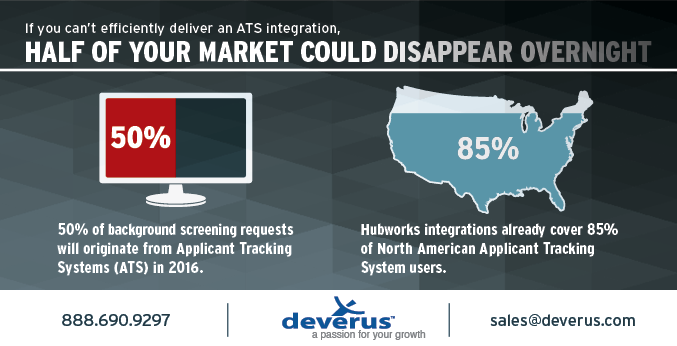




 Innovative Enterprises Expands Solution Set to Include Military Court Martial Records
Innovative Enterprises Expands Solution Set to Include Military Court Martial Records 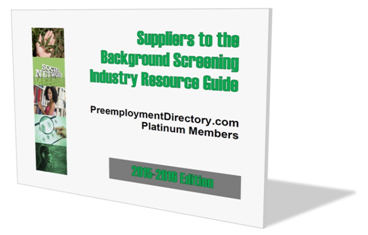
 Kevin Coy is a Partner in the Washington DC office of Arnall
Golden Gregory LLP. Kevin
Kevin Coy is a Partner in the Washington DC office of Arnall
Golden Gregory LLP. Kevin 


 Grab a latte and pull up a chair and join us for a great interview with Sherri Ervin, Owner, The Public Record Source LLC.
Grab a latte and pull up a chair and join us for a great interview with Sherri Ervin, Owner, The Public Record Source LLC. 
